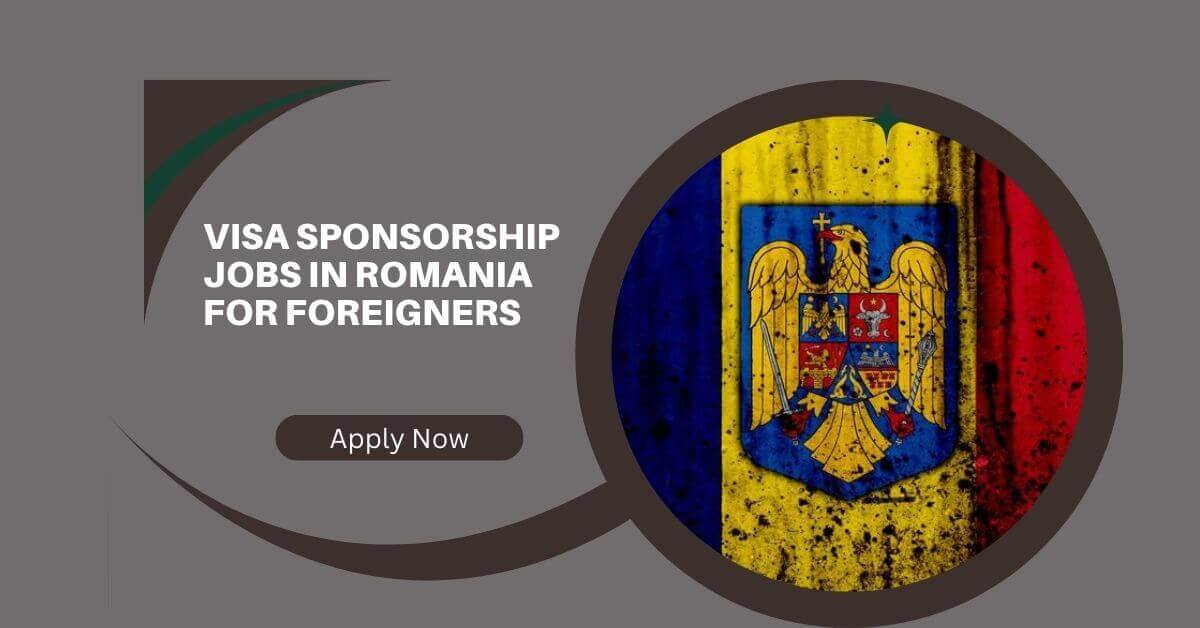Visa sponsorship jobs in Romania for foreigners in 2026 are ideal for individuals seeking legal and stable employment abroad. Salaries for these positions typically range between €700 and €1,500 per month, with accommodation, healthcare, and other benefits often included. These jobs cover various industries such as hospitality, retail, logistics, and manufacturing, allowing foreign workers to gain valuable skills and international work experience. With official visa sponsorship, employees are assured of regulated employment and legal protections. These roles not only provide financial stability but also offer opportunities for career advancement, professional development, and exposure to Romania’s dynamic workforce. For foreigners seeking secure and rewarding work abroad, these jobs present an excellent pathway to growth and international experience.
What firms are recruiting in Romania for Sponsorship Positions?
The top companies currently offering sponsorship positions include
- Parimatch Tech
- The Coca-Cola Company
- MSD
- Goodyear
- Nestle
- Baker Hughes
- Mindray
- Infosys
- Temenos
- Plexus
Visa Sponsorship Jobs in Romania For Foreigners:
The jobs in Romania with visa sponsorship for foreigners are listed below:
- Brand Manager – Juices & Tea
- Junior Accountant
- Strategy and Consulting SME Associate Manager
- Registered Nurse
- EOI – Electricians & Refrigeration Mechanics
- Landscape Gardener/Foreman
- Sales Representative (Industrial Products)
- Mechanical Engineer
- Switchboard Electricians
- Medical Imaging Technologist (Radiographer)
- Civil Engineer
- Aircraft Maintenance Planner
- Technician
- Automotive Mechanic
Romanian Work Visa Types:
Romania is a part of the European Union (EU), so its rules on work permits and visas are the same as those in other EU countries. People from Switzerland and other EEA countries, as well as people from other EU member states, do not need a work pass to work in Romania (EEA). Liechtenstein, Iceland, and Norway are some of these countries.
People who want to work but are not citizens of one of these countries need a work pass. Foreigners can get a lot of different kinds of rights in Romania, such as those for:
- Seasonal workers
- Trainees
- Athletes
- Permanent employees
- Cross-border workers
- Nominal work
Qualifications for Romanian Work Visas:
People from other countries can’t apply for a work pass in Romania on their own. Employers have to fill out applications for them.
If the job can’t be taken by a Romanian citizen or a citizen of another EU or EEA member state, then a permit will be given. One of the requirements for getting a pass is to do this. The person who wants to work for the company must also meet the following conditions:
- Follow all the legal rules that your boss sets out for you to work.
- have never been convicted of a crime that would keep them from working in Romania.
- Give a medical certificate that says you are healthy enough to do the job’s main tasks.
- You must meet the requirements for foreigners who can get a work visa every year.
The worker also needs to apply for a long-term visa. In addition to the application, the person applying should be ready to give many other papers, such as
- the employer’s permission to work.
- proof of a place to stay in Romania.
- a valid passport
- two new pictures to help identify them.
- Proof of health insurance for the length of the visit.
- Police clearance or background checks from the employee’s home country.
- proof that the money for the trip will be paid for.
- A flight ticket is an example of proof that you have made trip plans.
The Application Procedure:
Foreigners will need both a work permit and a long-term visa in order to legally live and work in Romania. These are the steps you need to take to get these papers:
- They have to give the Inspectorate General for Immigration (IGI) the right paperwork and pay the right fees so that they can apply for the work permit on behalf of the possible employee.
- Within 30 days, the IGI will either decide what to do or ask for more information to confirm what they already know. Depending on what needs to be checked more closely, the process could take up to 15 days longer.
- If the IGI agrees with the job application, the person will be given a work pass.
- The worker must then apply for a long-term visa through one of Romania’s foreign missions or consular offices. The worker has 60 days from the time they get their work permit to apply.
Important Factors:
Through the IGI, an employee can ask to stretch the time they can stay in the country on their long-term visa. They have to send the request at least 30 days before their visa runs out. They could also get a new work pass at the same time.
One year can be added to most work permits in Romania. Employees with a lot of skills might be able to get an extra two years.
There’s a good chance that some workers will bring family members with them. If someone in your family wants to work in Romania, they will each need their own work pass and long-term visa.
What is the cost of a Romanian visa?
Visit https://evisa.mae.ro to make an appointment. A long-stay visa costs $150 and a short-stay visa costs $80.
In Romania, what professions are in demand?
Most people are employed in the following sectors:
- Agriculture Workers.
- Warehouse & Retail Workers.
- Construction and Real Estate.
- Automotive & IT Industry.
- Finance and Accounting sector.
What is the typical wage in Romania?
It went down to 6405 RON (1273.714 USD) a month on average in Romania in July 2022. Workers made an average of 5906 RON a month, with 1.02 RON being the lowest average wage possible.
The Romanian labor market:
As far as job prospects go, the IT software industry is the best. Romania is a great place for outsiders who want to work in this field to make their dreams come true.
Most of the chances are in big towns like Bucharest, Cluj Napoca, Timisoara, or Iasi. People from other countries who want to work for small businesses will be drawn to smaller towns. The cost of living is also cheaper, and there are more opportunities to teach English and start small businesses.
Romanian curriculum vitae and cover letters:
This is a general rule: expats should write their CVs and cover letters in both English and Romanian. You can send your resume in either English or French to jobs where the only language requirement is being able to speak and understand a foreign language.
When writing CVs, they have to follow certain rules in Romania. The first thing that will be asked for is general information. Next will be work experience, education, personal skills, and so on. Most companies will want you to have a Europass model on your resume to get hired. You might also want to ask TopCV for a free review of your CV.
Read Also: Unskilled Jobs in Romania for Foreigners Visa Sponsorship
Romanian employment:
According to figures made public by the Romanian Ministry of Labor, several industries—including IT, ICT, health care, agriculture, construction, and manufacturing—particularly the garment and textile industry—are experiencing a severe labor shortage. According to reports from the European Commission, there are more open employment positions in the following professions since there is a strong demand for workers in those industries. It could be simpler to get work in these fields:
- Garment and related trades workers
- Building finishers and related trades workers
- Painters, building structure cleaners, and related trades workers
- Textile, fur, and leather products machine operators
- Printing trades workers
- Refuse workers
- Physical and engineering science technicians
- Wood treaters, cabinet-makers, and related trades workers
- Building frame and related trades workers
- Manufacturing laborers
- Cooks; Waiters; Bartenders
- Electro technology engineers
- Material-recording and transport clerks
- Machinery mechanics and repairers
- Food processing and related trade workers
- Software and applications developers and analysts
- Shop salespersons
- Drivers and mobile plant operators
- Building construction laborers
- Doctors/nurses/health care assistants
What is the average monthly wage in Romania?
In 2022, the average wage in Romania will be 8,980 RON, which is the country’s currency. That’s 107,760 RON a year. Based on the exchange rates in February 2022, that’s equal to about $2,074 USD each month.
How much does a Romanian factory worker make?
The average salary for a factory worker in Romania is RON 36,021 per year or RON 17 per hour. Most factory workers make between RON 27,340 and RON 41,929 a month. The most schooling a factory worker usually has is a Less Than HS Degree.
Benefits of Jobs:
- Employment Opportunities: Romania’s job market is growing, and there are openings in many fields, such as IT, engineering, banking, and healthcare. Foreigners can take advantage of these chances with the help of visa sponsorship.
- Cultural Experience: Working in Romania gives you the chance to learn about these things, which can be beneficial and help you grow professionally and personally.
- Competitive Salaries: There are a lot of jobs in Romania that pay well, especially in IT and engineering. Compared to Western European countries, the cost of living is lower, which makes it a good choice.
- Career Growth: Getting work experience in Romania can help your resume and give you international knowledge that can help you get jobs in the future.
- Quality of Life: Romania has a good quality of life because healthcare, schooling, and fun things to do are all affordable. Bucharest and Cluj-Napoca, for example, are known for having lively arts scenes.
- EU Access: Because Romania is a member of the EU, it has access to the larger European market and lets people visit and work in other EU countries.
- Visa and Work Permit: When a company sponsors a worker visa, they usually take care of the visa and work permit process. This makes moving easier and more streamlined.
- Networking: Working in Romania lets you make contacts with professionals in the country and other countries, which can help you move up in your job.
- Local Insights: If your job involves doing business in Romania or Eastern Europe, learning about the Romanian market and industry can be very helpful.
- Travel Opportunities: Because Romania is centrally located, it is easy to get to other European countries, making it possible to travel and explore the continent.
Conclusion:
There are a lot of job openings in a lot of different fields because the economy is growing and people need skilled workers more than ever, especially in IT, engineering, and healthcare. Sponsorship from an employer makes it easier to get a work visa, which makes it a desirable place to advance in your job and grow as a person. You can start your journey toward a satisfying career in Romania by looking for jobs with top companies and learning about the visa requirements.
Frequently Asked Questions:
What are the requirements for obtaining a Romanian work visa?
You need an offer of work from a Romanian company in order to get a work visa. The employer will then apply for the visa on your behalf. You also need to show things like a current passport, proof of where you will stay, a medical certificate, and results of background checks.
How much does a Romanian visa cost?
A long-stay visa costs $150, while a short-stay visa costs $80.






